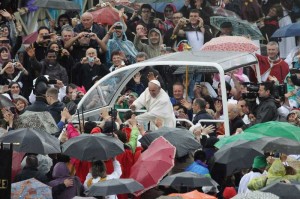 Pope Francis lambasted the Roman Curia, the administrative apparatus that enables him to govern the Roman Catholic church, in a speech in which he accused it of “spiritual Alzheimer’s” and a list of other shortcomings.
Pope Francis lambasted the Roman Curia, the administrative apparatus that enables him to govern the Roman Catholic church, in a speech in which he accused it of “spiritual Alzheimer’s” and a list of other shortcomings.
Also among the “15 diseases” that the pontiff claimed pose a threat to the Vatican’s administrative, executive and advisory body were “feeling immortal or essential”, susceptibility to “worldly profit and exhibitionism” and “rivalry and vainglory”.
The pope took advantage of the traditional meeting in the Clementine Hall to deliver Christmas greetings to the members of the Roman Curia, to warn against “15 shades of sin” that should at all costs be avoided.
The Vatican Insider, a La Stampa website, said Pope Francis began by saying: “It would be good to think of the Roman Curia as a small-scale model of the Church.”
However, he quickly added that “a member of the Curia who does not draw from that every day will become a mere bureaucrat”.
Before the Cardinals heading the departments making up the Roman Curia, the Pope started off his list of 15 diseases with “feeling immortal or essential”.
“A curia that does not practise self-criticism, does not keep up to date, does not try to better itself, is an infirm body” the Pope said.
He urged the those attending to visit cemeteries and behold what became of those who “thought they were immortal, exempt and essential”.
For Francis, “it often comes from the pathology of power, the Messiah complex and narcissism”.
Among other diseases threatening the Roman Curia, the Pope also cited “the disease of excessive activity and the diseases of mental and spiritual petrification” which makes people “unable to weep with those who weep and rejoice with those who rejoice”.
He also pointed to “the disease of over-planning” and “bad coordination”.
The Pontiff also stressed “spiritual Alzheimer’s”, which he described as people “losing their memory of their personal encounter with the Lord, in those who depend on their passions, whims and obsessions” making them “live in a state of absolute dependence on their, often imagined, views”.
Among other diseases listed in the Pope’s catalogue were “rivalry and vainglory” and “existential schizophrenia” which he defined as “the disease of those who live a double life, a result of the hypocrisy typical of mediocre people and of advancing spiritual emptiness.”
“It often strikes us that some abandon the pastoral service and limit their activities to bureaucracy,” the Pope said.
Francis also highlighted the diseases of “gossip and chatter” and “deifying the leaders” which he characterised as the disease of “those who court their superiors, becoming victims of careerism and opportunism, and live their vocation thinking only of what they must gain and not of what they must give”.
He also mentioned in his speech the disease of “indifference to others” and “the funeral face”, confirming that an apostle must “strive to be a polite, serene, enthusiastic and joyful person”, while he noted the importance of having a sense of “humour and self-irony”.
Pope Francis also talked about the diseases of “hoarding”, belonging to “closed circles” and “the disease of worldly profit and exhibitionism”.
Francis ended by recalling that he had once read that “priests are like airplanes, they make the headlines only when they fall”. He also warned of “how much a single priest who ‘falls’ may hurt the whole body of the Church”.